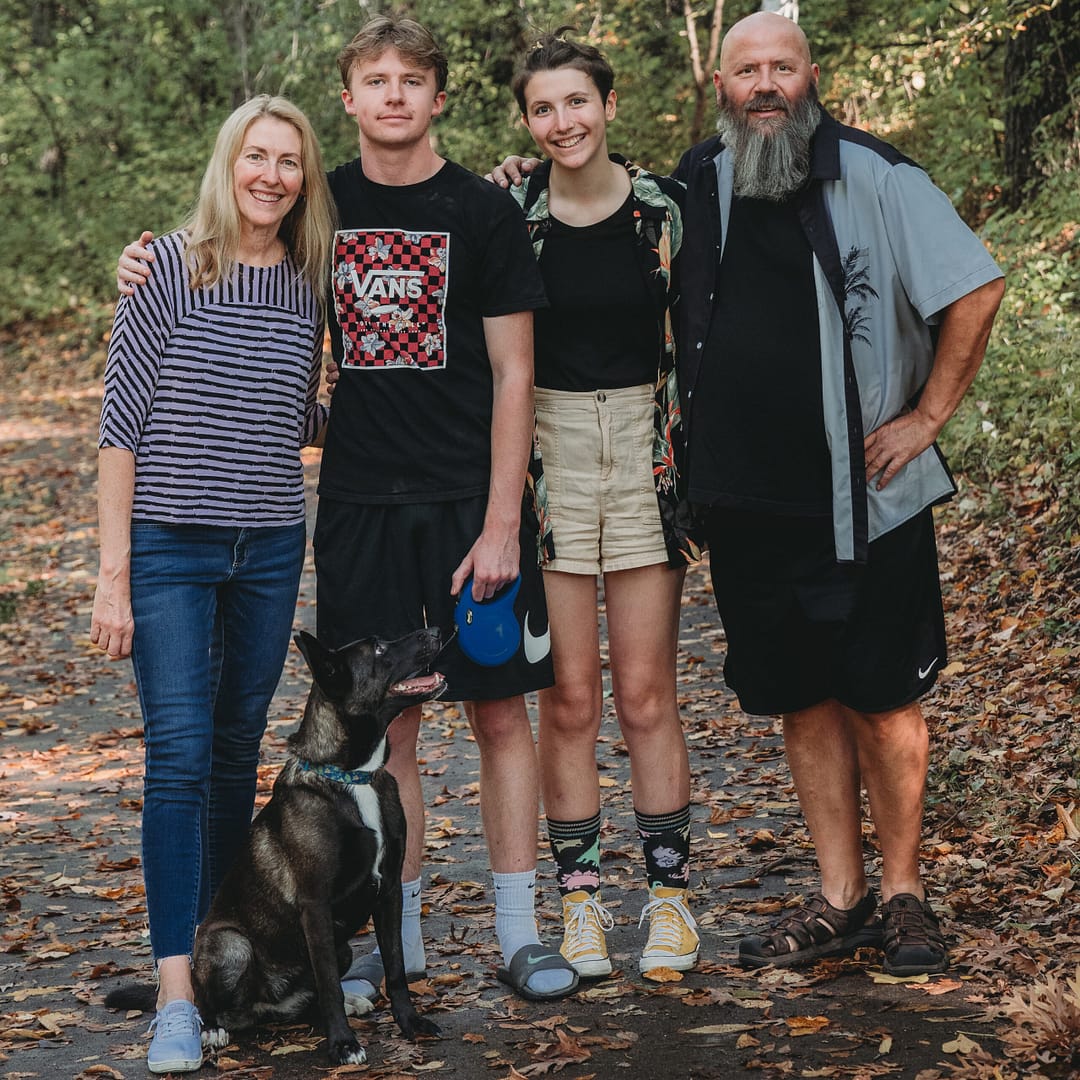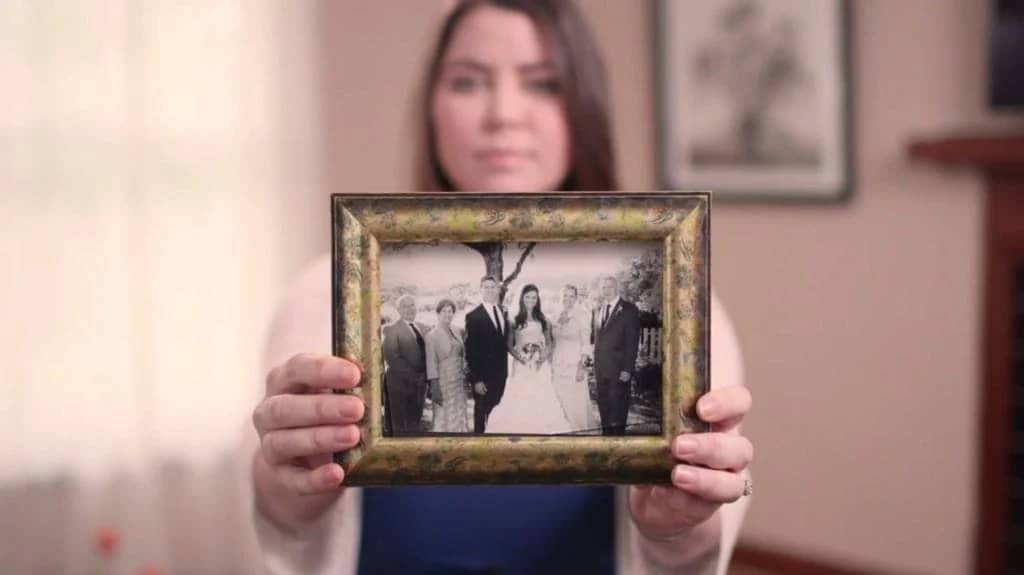
If you believe that terminally ill residents in Minnesota should not have to suffer like Jeff, add your name here.
Jeff McComas shared his story in October of 2023.

Jeff and his daughter displaying their tattoos
I have a matching tattoo with my 17-year-old daughter that reads: “It’s not zero.” My tattoo is in her handwriting on my left arm, and her tattoo is in my handwriting on her left arm. It’s not zero days left. It’s not zero-percent hope. It’s not a zero chance that I won’t get to see her graduate high school. (Next up: My son and I need to come up with “our phrase” to tattoo on our right arms.)
There is hope. There are days ahead for me. It’s not zero.
The first sign of medical trouble was in September 2022 when a small bowel obstruction during an annual “boys’ weekend” with brothers led me to an ER visit and a multiple-day hospital stay. The following months were a blur of additional testing to find out why. Colonoscopies. MRI / MRE. PET scan. CT scans. X-rays. Blood work. Biopsy. Stomach endoscopy.
In January of 2023 it was confirmed that I have cancer. Stage 4, incurable, inoperable metastatic adenocarcinoma of the small intestine, which has spread to my peritoneum and lungs … so far. My original prognosis was one year from diagnosis. Now, with receiving chemo every two weeks and responding well to that, my current prognosis is estimated for the summer of 2025. Though the chemo will never cure me, it’s holding the line, with no spread or growth of existing tumors (but also no shrinking of tumors).
The news came as a shock, and my family and I were in a state of disbelief. We have gone from shock to denial and anger, to negotiating, and finally to acceptance. But it’s not a linear path. There’s always a lot of doubling back on that grief scale. This process has taught me that sadness is a choice. Happiness is a choice. Anger is a choice. They really are. We make our choice daily. Today, I choose happiness. And tomorrow too.
Being surrounded by loving people makes me feel less afraid. Human connection, I have found, is the meaning of life. While the side effects of cancer and its treatments can be burdensome, I fight through them, try not to complain and make the best of my time. I play pickleball for a few hours most days (hopefully with my wife), take our dog Luna on walks and to the dog park, tutor Ukrainians in English, travel as much as possible, and am going full speed ahead on unplanned activities.
And I’ve been fortunate to have access to great care at the Mayo Clinic. I was referred to the Mayo Clinic by my medical team at Minnesota Oncology so that I would have the latest and best cancer treatment and opportunities to participate in clinical studies. Mayo really lives up to their name — efficient, thorough, human, modern, caring and a leader in health science. I am grateful for both Mayo and Minnesota Oncology’s help in maximizing and optimizing my time left.
But even with my phenomenal medical team, my options in Minnesota are limited. I’ll never be “cancer free” or in remission. And at some point, the chemo will stop being effective, and either my cancer will continue spreading or the tumors will grow in size. I don’t want a long, drawn-out end. I didn’t pick this road, but I’m on it, and I want control in deciding when I’ve suffered enough.
I want as many pretty good days as possible, just a very few really bad days and then a quick end surrounded by love — hopefully many, many years from now (or at least many, many months).
I never really thought about medical aid in dying before I got sick. But with my wife’s business having been in end-of-life veterinary care, we had oftentimes said over the last 13 years, “Why can’t we do this for humans? With the peace and privacy of one’s own home, surrounded by love.” After my diagnosis, it became personal, and I became frustrated by the fact that Minnesota does not yet allow its dying residents to decide if medical aid in dying is right for them. It’s madness that I don’t have the ability to choose my own ending here in Minnesota.
Other states’ residents can do it. It’s not a partisan issue, though the Democrats have taken the lead. I break ranks with my Republican party on this. It’s wrong to withhold the option from dying adults of sound mind. How dare anyone tell me that I can’t have a peaceful, painless end to my suffering? Or dictate that I have to travel to another state to get this done? I should be able to have my local oncology team, who knows me and my condition, prescribe medical aid in dying instead of having to meet a whole new set of doctors in a different state.
I need Minnesota to pass a medical aid-in-dying bill soon. I won’t see 2030. I want to be empowered to make my own end-of-life decisions, not having the medical community fighting to keep me alive one more painful day. If the end is here, I’m of the mindset that it is better a day too soon than a week too late. I need to be allowed to pick the day and manner of my choosing, and have my wife and children at my side. I will not slowly, painfully, inexorably pass away. I will be in charge of my own passing. I’m willing to do what it takes and travel, but I’d much prefer to die painlessly in our home in Minnesota.

Nothing advances our common cause of improving end-of-life care like real stories. Inspire others and drive change by sharing your story today.
Mail contributions directly to:
Compassion & Choices Gift Processing Center
PO Box 485
Etna, NH 03750